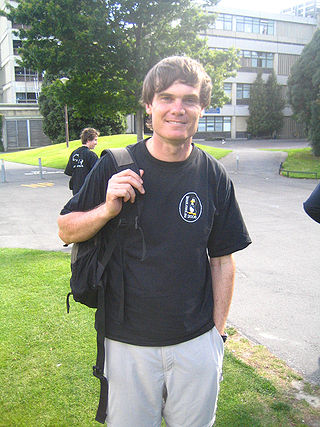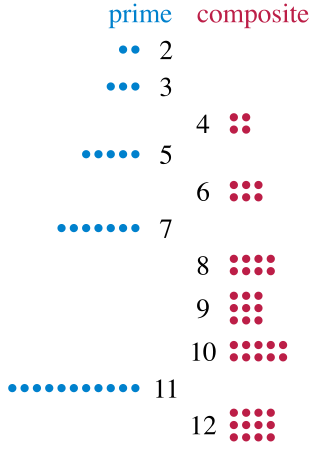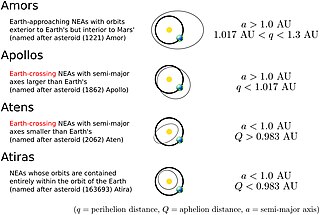Biography
Noll was born in Walnut Creek, California, United States. At age 18, he became the youngest person to break the record for the largest known prime. He has held or co-held the record three times. [5] He is also the co-inventor (with John Horton Conway) of a system for naming arbitrarily large powers of 10. [6] [7] He also helped start the International Obfuscated C Code Contest, [8] and is a co-inventor of the Fowler Noll Vo hash function. [9]
He was also a member of the Amdahl Six [10] team (John S. Brown, Bodo Parady, Curt Landon Noll, Gene W. Smith, Joel F. Smith, and Sergio E. Zarantonello) which discovered another record prime in 1989; this prime remains unusual as a record large prime as it was not a Mersenne prime. [11] [12]
Noll is an amateur astronomer. [13] [14] His work includes measuring the Solar parallax during the 2004 Transit of Venus [15] as well as the search for Vulcanoid asteroids. [16]
He was also involved in politics as a Sunnyvale, California city council member and vice-mayor. [17]

Andrew "Tridge" Tridgell is an Australian computer programmer. He is the author of and a contributor to the Samba file server, and co-inventor of the rsync algorithm.

The Great Internet Mersenne Prime Search (GIMPS) is a collaborative project of volunteers who use freely available software to search for Mersenne prime numbers.
In mathematics, a Mersenne prime is a prime number that is one less than a power of two. That is, it is a prime number of the form Mn = 2n − 1 for some integer n. They are named after Marin Mersenne, a French Minim friar, who studied them in the early 17th century. If n is a composite number then so is 2n − 1. Therefore, an equivalent definition of the Mersenne primes is that they are the prime numbers of the form Mp = 2p − 1 for some prime p.

A prime number is a natural number greater than 1 that is not a product of two smaller natural numbers. A natural number greater than 1 that is not prime is called a composite number. For example, 5 is prime because the only ways of writing it as a product, 1 × 5 or 5 × 1, involve 5 itself. However, 4 is composite because it is a product (2 × 2) in which both numbers are smaller than 4. Primes are central in number theory because of the fundamental theorem of arithmetic: every natural number greater than 1 is either a prime itself or can be factorized as a product of primes that is unique up to their order.

The International Obfuscated C Code Contest is a computer programming contest for the most creatively obfuscated C code. Held semi-annually, it is described as "celebrating [C's] syntactical opaqueness". The winning code for the 27th contest, held in 2020, was released in July 2020. Previous contests were held in the years 1984–1996, 1998, 2000, 2001, 2004–2006, 2011–2015 and 2018–2020.

Vulcan was a theorized planet that some pre-20th century astronomers thought existed in an orbit between Mercury and the Sun. Speculation about, and even purported observations of, intermercurial bodies or planets date back to the beginning of the 17th century. The case for their probable existence was bolstered by the support of the French mathematician Urbain Le Verrier, who had predicted the existence of Neptune using disturbances in the orbit of Uranus. By 1859 he had confirmed unexplained peculiarities in Mercury's orbit and predicted that they had to be the result of the gravitational influence of another unknown nearby planet or series of asteroids. A French amateur astronomer's report that he had observed an object passing in front of the Sun that same year led Le Verrier to announce that the long sought after planet, which he gave the name Vulcan, had been discovered at last.

Sunnyvale is a city located in the Santa Clara Valley in northwest Santa Clara County in the U.S. state of California.

The ILLIAC II was a revolutionary super-computer built by the University of Illinois that became operational in 1962.

The vulcanoids are a hypothetical population of asteroids that orbit the Sun in a dynamically stable zone inside the orbit of the planet Mercury. They are named after the hypothetical planet Vulcan, which was proposed on the basis of irregularities in Mercury's orbit that were later found to be explained by general relativity. So far, no vulcanoids have been discovered, and it is not yet clear whether any exist.

James Craig Watson was a Canadian-American astronomer, discoverer of comets and minor planets, director of the University of Michigan's Detroit Observatory in Ann Arbor, and awarded with the Lalande Prize in 1869.

Atira asteroids or Apohele asteroids, also known as interior-Earth objects (IEOs), are Near-Earth objects whose orbits are entirely confined within Earth's orbit; that is, their orbit has an aphelion smaller than Earth's perihelion, which is 0.983 astronomical units (AU). Atira asteroids are by far the least numerous group of near-Earth objects, compared to the more populous Aten, Apollo and Amor asteroids.
Fowler–Noll–Vo is a non-cryptographic hash function created by Glenn Fowler, Landon Curt Noll, and Kiem-Phong Vo.

The largest known prime number is 282,589,933 − 1, a number which has 24,862,048 digits when written in base 10. It was found via a computer volunteered by Patrick Laroche of the Great Internet Mersenne Prime Search (GIMPS) in 2018.
Brian George Hayward is a Canadian former professional ice hockey goaltender who is Color commentator for Anaheim Ducks broadcasts on Prime Ticket/Bally Sports SoCal/Bally Sports West and KDOC.
James Whitney Young is an American astronomer who worked in the field of asteroid research. After nearly 47 years with the Jet Propulsion Laboratory at their Table Mountain Facility, Young retired July 16, 2009.

594913 ꞌAylóꞌchaxnim (provisional designation 2020 AV2) is a large near-Earth asteroid discovered by the Zwicky Transient Facility on 4 January 2020. It is the first asteroid discovered to have an orbit completely within Venus's orbit, and is thus the first and only known member of the eponymous ꞌAylóꞌchaxnim (informally named Vatira before its discovery) population of Atira-class asteroids. ꞌAylóꞌchaxnim has the smallest known aphelion and third-smallest known semi-major axis among all asteroids. With an absolute magnitude approximately 16.2, the asteroid is expected to be larger than 1 km in diameter.
2021 PH27 is a near-Earth asteroid of the Atira group. It was discovered by Scott Sheppard using the Dark Energy Survey's DECam imager at NOIRLab's Cerro Tololo Inter-American Observatory on 13 August 2021. 2021 PH27 has the smallest semi-major axis and shortest orbital period among all known asteroids as of 2021, with a velocity at perihelion of 106 km/s (240,000 mph). It also has the largest value of the relativistic perihelion shift, 1.6 times that of Mercury. With an absolute magnitude of 17.7, the asteroid is estimated to be larger than 1 kilometer (0.6 miles) in diameter.












